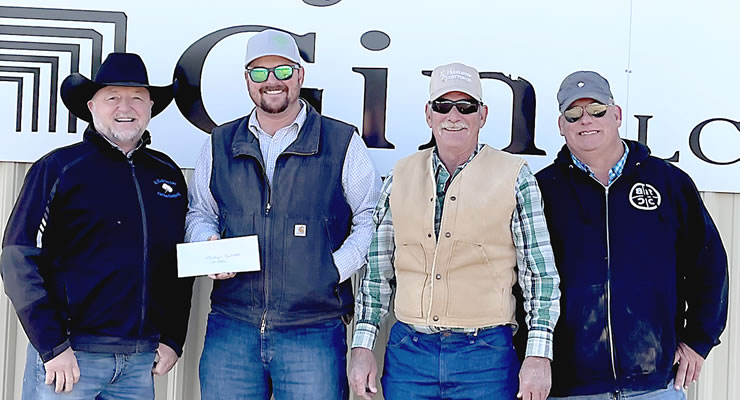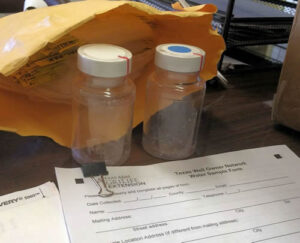
Newhouse gets first bale of 2022

The Clarendon Enterprise - Spreading the word since 1878.

Private water well owners in Donley County can take advantage of a water screening this month provided by the Texas AgriLife Extension and the Texas Water Resources Institute.

Well owners can pick up a testing kit from the Extension office at the Donley County Activity Center at 4430 Highway 70 North in Clarendon anytime, but the samples must be dropped off on November 14 between 8:30 a.m. and 10 a.m. Extension office. The cost is $15 per sample.
The Texas Well Owner Network is hosting the “Well Informed” water well screening give area residents the opportunity to have their well water screened. Water samples will be screened for contaminants, including total coliform bacteria, E. coli, nitrate-nitrogen and salinity.
A follow-up meeting to explain the results of the screenings will be at 4:00 p.m. November 15 at the Panhandle Groundwater Conservation District office – Windmill Room, 203 West Third Street, White Deer.
For more information, contact the AgriLife Extension office in Donley County at 806-874-2141.
The screening is presented by AgriLife Extension and Texas Water Resources Institute, TWRI, partnership with the AgriLife Extension offices in Potter, Armstrong, Carson, Gray and Donley Counties and the Panhandle Groundwater Conservation District.
Joel Pigg, Texas A&M AgriLife Extension Service program specialist and TWON coordinator, College Station, said the TWON program is for Texas residents who depend on household wells for their water needs. Water samples will be screened for contaminants, including total coliform bacteria, E. coli, nitrate-nitrogen and salinity.
“It is very important that only sampling bags and bottles from the AgriLife Extension office be used and all instructions for proper sampling are followed to ensure accurate results,” Pigg said.
Private water wells should be tested annually, he said. The samples will be screened for contaminants, including total coliform bacteria, E. coli, nitrate-nitrogen and salinity.
Pigg said it is extremely important for those submitting samples to be at the November 15 meeting in order to receive results, learn corrective measures for identified problems and improve their understanding of private well management.
Pigg said research shows the presence of E. coli bacteria in water indicates that waste from humans or warm-blooded animals may have contaminated the water. Water contaminated with E. coli is more likely to also have pathogens present that can cause diarrhea, cramps, nausea or other symptoms.
The presence of nitrate-nitrogen in well water is also a concern, and water with nitrate-nitrogen at levels of 10 parts per million is considered unsafe for human consumption, he said.
“These nitrate levels above 10 parts per million can disrupt the ability of blood to carry oxygen throughout the body, resulting in a condition called methemoglobinemia,” Pigg said. “Infants less than 6 months of age and young livestock are most susceptible to this.”
Salinity, as measured by total dissolved solids, will also be determined for each sample, he said. Water with high levels may leave deposits and have a salty taste. Using water with high levels for irrigation may damage soil or plants.
To learn more about the programs offered through the network or to find additional publications and resources, visit http://twon.tamu.edu.
Funding for the Texas Well Owner Network is through a Clean Water Act nonpoint source grant provided by the Texas State Soil and Water Conservation Board and the US Environmental Protection Agency. The project is managed by TWRI, part of Texas A&M AgriLife Research, AgriLife Extension and the Texas A&M University College of Agriculture and Life Sciences.
Private water well owners in Donley County can take advantage of a water screening this month provided by the Texas AgriLife Extension and the Texas Water Resources Institute.
Well owners can pick up a testing kit from the Extension office at the Donley County Activity Center at 4430 Highway 70 North in Clarendon anytime, but the samples must be dropped off on November 14 between 8:30 a.m. and 10 a.m. Extension office. The cost is $15 per sample.
The Texas Well Owner Network is hosting the “Well Informed” water well screening give area residents the opportunity to have their well water screened. Water samples will be screened for contaminants, including total coliform bacteria, E. coli, nitrate-nitrogen and salinity.
A follow-up meeting to explain the results of the screenings will be at 4:00 p.m. November 15 at the Panhandle Groundwater Conservation District office – Windmill Room, 203 West Third Street, White Deer.
The screening is presented by AgriLife Extension and Texas Water Resources Institute, TWRI, partnership with the AgriLife Extension offices in Potter, Armstrong, Carson, Gray and Donley Counties and the Panhandle Groundwater Conservation District.
Joel Pigg, Texas A&M AgriLife Extension Service program specialist and TWON coordinator, College Station, said the TWON program is for Texas residents who depend on household wells for their water needs. Water samples will be screened for contaminants, including total coliform bacteria, E. coli, nitrate-nitrogen and salinity.
“It is very important that only sampling bags and bottles from the AgriLife Extension office be used and all instructions for proper sampling are followed to ensure accurate results,” Pigg said.
Private water wells should be tested annually, he said. The samples will be screened for contaminants, including total coliform bacteria, E. coli, nitrate-nitrogen and salinity.
Pigg said it is extremely important for those submitting samples to be at the November 15 meeting in order to receive results, learn corrective measures for identified problems and improve their understanding of private well management.
Pigg said research shows the presence of E. coli bacteria in water indicates that waste from humans or warm-blooded animals may have contaminated the water. Water contaminated with E. coli is more likely to also have pathogens present that can cause diarrhea, cramps, nausea or other symptoms.
The presence of nitrate-nitrogen in well water is also a concern, and water with nitrate-nitrogen at levels of 10 parts per million is considered unsafe for human consumption, he said.
“These nitrate levels above 10 parts per million can disrupt the ability of blood to carry oxygen throughout the body, resulting in a condition called methemoglobinemia,” Pigg said. “Infants less than 6 months of age and young livestock are most susceptible to this.”
Salinity, as measured by total dissolved solids, will also be determined for each sample, he said. Water with high levels may leave deposits and have a salty taste. Using water with high levels for irrigation may damage soil or plants.
To learn more about the programs offered through the network or to find additional publications and resources, visit http://twon.tamu.edu. For more information, contact the AgriLife Extension office in Donley County at 806-874-2141.
Funding for the Texas Well Owner Network is through a Clean Water Act nonpoint source grant provided by the Texas State Soil and Water Conservation Board and the US Environmental Protection Agency. The project is managed by TWRI, part of Texas A&M AgriLife Research, AgriLife Extension and the Texas A&M University College of Agriculture and Life Sciences.
Bruce Ferguson, Executive Director of USDA’s Farm Service Agency in Donley County has announced that the 2009 FSA county committee elections start this week as ballots are being mailed to eligible voters.
December 7, 2009, is the deadline for eligible voters to return ballots to their local FSA offices.
“The FSA county committee system is unique among government agencies, because it allows producers to make important decisions concerning the local administration of federal farm programs,” said Ferguson. “I urge all eligible farmers and ranchers, especially minorities and women, to get involved and make a real difference in their communities by voting in this year’s elections.”
Committee members apply their knowledge and judgment to make decisions on disaster and conservation payments, establishment of allotments and yields, producer appeals, employing FSA county executive directors and other local issues. FSA committees operate within official regulations designed to carry out federal laws.
To be an eligible voter, farmers and ranchers must participate or cooperate in FSA programs. A person who is not of legal voting age, but supervises and conducts the farming operations of an entire farm, can also vote. Agricultural producers in each country submitted candidate names during the nomination period held last summer.
Eligible voters who do not receive ballots in the coming week can obtain ballots at their local USDA Service Center. December 7, 2009, is the last day for voters to submit ballots in person to local USDA Service Centers. Ballots returned by mail must be postmarked no later than December 7. Newly elected committee members and alternates take office January 1, 2010.
Close to 8,000 FSA county committee members meet monthly at more than 2,300 FSA offices nationwide. Each committee consists of three to five members who serve three-year terms. Approximately one-third of county committee seats are up for election annually.
For more information about FSA county committees and FSA programs, visit: http://www.fsa.usda.gov.

Reader Comments